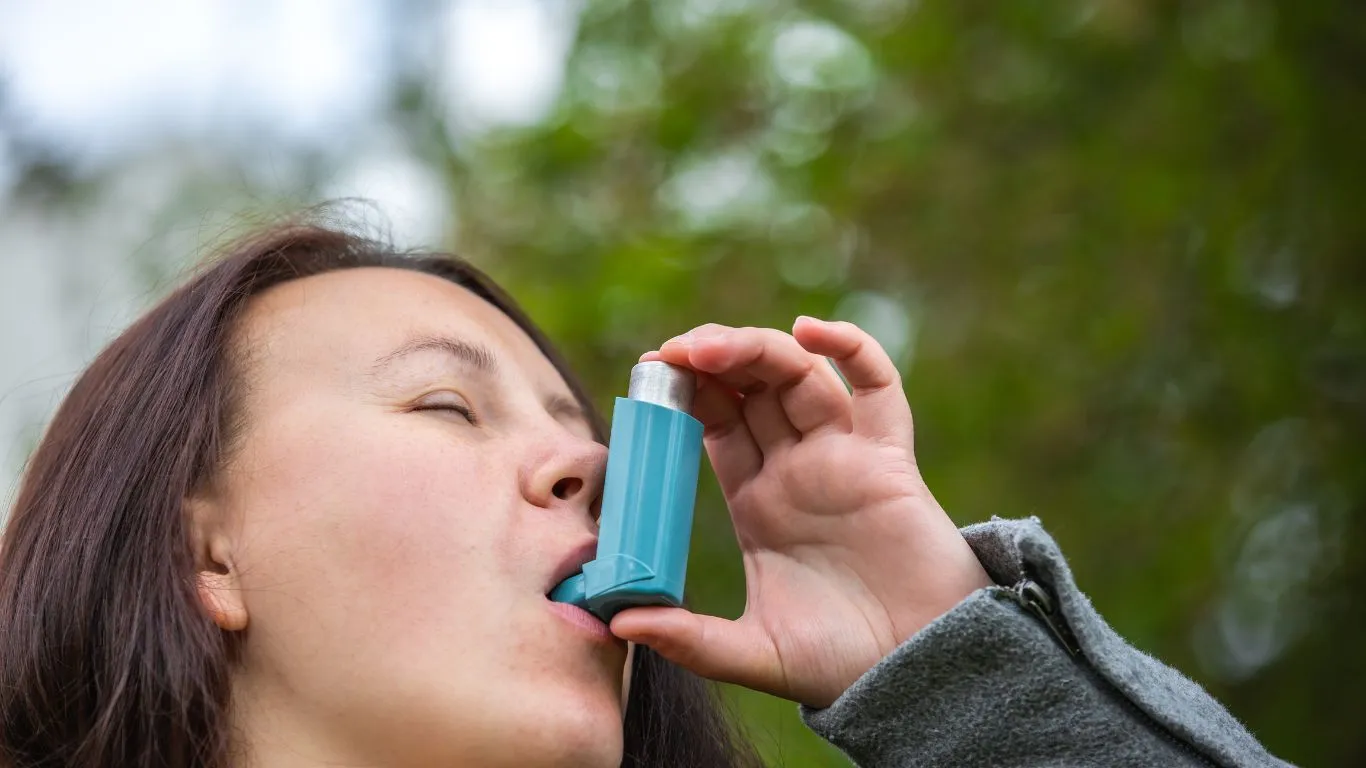Can Asthma Cause Dehydration? Key Symptoms and Effective Solutions
As an asthma expert, I’ve seen firsthand the struggles that come with managing asthma symptoms, especially when other health issues complicate things further. One common question I get asked often is, “Can asthma cause dehydration symptoms?” It’s a valid concern, considering that asthma attacks and the medications used to treat them can have various effects on the body. Today, I want to break down this question and help you understand the connection between asthma and dehydration, its symptoms, and how to manage both for a healthier life.
Understanding Asthma and Dehydration

Asthma is a chronic respiratory condition where the airways become inflamed and narrowed, making it harder to breathe. It’s an issue many of us are familiar with, especially those who experience frequent flare-ups. The condition affects millions of people worldwide and can be triggered by allergens, exercise, cold air, or even stress. But what does asthma have to do with dehydration? The short answer is: a lot more than you might think.
Dehydration happens when the body loses more fluids than it takes in, which leads to a lack of adequate water for its normal functions. When your body is dehydrated, it can cause a range of symptoms, including fatigue, dry skin, dizziness, and dry mouth. But how does asthma contribute to this? Well, let’s dive into how asthma and dehydration are connected.
How Asthma Medications Can Affect Hydration

If you’ve been prescribed asthma medications, particularly inhalers, you may have noticed that they can sometimes leave you feeling a bit parched. This is because certain asthma medications, like bronchodilators, work by relaxing the muscles around your airways, making it easier to breathe. However, these medications can also have a side effect of increasing the amount of fluid your body loses.
For instance, beta-agonists, which are commonly used to treat asthma, can increase urination, leading to a higher risk of dehydration. Oral steroids, another class of drugs often prescribed to manage asthma flare-ups, can also contribute to dehydration by reducing your body’s ability to retain water. While these medications are incredibly effective in managing asthma symptoms, they can sometimes leave you feeling dehydrated, especially if you’re not taking in enough fluids to counterbalance the loss.
Dehydration Symptoms to Watch Out For
Being aware of the symptoms of dehydration is crucial if you’re managing asthma. Some of the most common signs of dehydration include:
- Dry mouth and throat: This is one of the earliest signs, especially if you’re using inhalers or taking medication that may dry out your mouth.
- Fatigue: If you feel unusually tired or sluggish, it could be a sign that your body isn’t properly hydrated.
- Dizziness or lightheadedness: Dehydration can cause your blood pressure to drop, making you feel faint or dizzy.
- Dry skin: Your skin may feel dry and less elastic, another telltale sign that you need more water.
- Dark-colored urine: If your urine is darker than usual, it’s a clear indicator that you’re not drinking enough water.
The Impact of Dehydration on Asthma

When you’re dehydrated, your airways can become even more sensitive and reactive. This is particularly concerning for asthma sufferers because dehydration can lead to worsened asthma symptoms, including:
- Increased airway inflammation: Dehydration can cause the mucus lining in your airways to thicken, making it harder to clear out irritants or allergens.
- Increased risk of asthma attacks: When you’re dehydrated, your body has a harder time dealing with triggers, which means you may be more likely to experience an asthma flare-up.
- Reduced lung function: Dehydration can also lead to poor lung function, as the airways are less able to expand and contract properly.
All of these factors combine to create a less-than-ideal situation for managing asthma. If your body is dehydrated, your asthma symptoms may become harder to control, which could lead to a more challenging experience for you as an individual dealing with asthma.
How to Stay Hydrated While Managing Asthma
The good news is that staying hydrated and managing asthma doesn’t have to be a complicated task. In fact, it’s all about balance and being mindful of your body’s needs. Here are some simple tips that can help you stay hydrated while keeping your asthma under control:
- Drink water consistently: Aim to drink at least 8 glasses of water a day, or more if you’re active or in a hot environment. Carrying a water bottle with you is a great reminder to stay hydrated.
- Avoid dehydrating beverages: While it’s tempting to reach for a soda or coffee, both caffeine and alcohol can lead to dehydration. Try to limit your intake of these, especially if you’re prone to dehydration.
- Keep track of your symptoms: Pay attention to your asthma symptoms and notice if they worsen when you’re dehydrated. This awareness can help you better manage both your asthma and hydration levels.
- Eat water-rich foods: Foods like cucumbers, watermelon, and oranges have high water content and can help you stay hydrated. Incorporating them into your meals is an easy way to boost your hydration levels.
Signs Your Asthma is Triggering Dehydration

As we’ve already discussed, dehydration and asthma don’t exactly play well together. It’s not just about keeping yourself hydrated; it’s about understanding when dehydration is sneaking up on you and how it impacts your asthma symptoms. Being able to recognize these signs can make a huge difference in how well you manage both issues.
From personal experience and working with numerous asthma patients, I’ve seen that dehydration can often worsen asthma symptoms in sneaky ways. If you’re finding it more difficult to breathe or your inhaler isn’t working as effectively, dehydration might be a contributing factor. Here are a few common signs that your asthma is triggering dehydration symptoms:
1. Increased Thirst or Dry Mouth
This is the most obvious sign, but surprisingly, many people overlook it. If you’re constantly thirsty or feel like you’re unable to get enough water, your body may be telling you something important. The combination of asthma medications and the natural process of managing asthma can leave you with a dry mouth and a strong urge to drink more fluids.
It’s also important to keep in mind that inhalers, especially bronchodilators, tend to dry out the mucous membranes in your respiratory system. This is why a dry mouth often accompanies asthma symptoms. So, if you notice your mouth feeling parched even after using your inhaler, this could be a sign that you need to drink more water.
2. Shortness of Breath or Wheezing
One of the classic signs of an asthma flare-up is shortness of breath or wheezing. But what if this symptom is made worse by dehydration? Yes, it happens. When your body lacks water, the mucus in your airways thickens, which can make it harder to breathe, especially if you’re dealing with asthma. The result? You may find yourself wheezing more than usual or even struggling to catch your breath.
In addition, dehydration can make your airways more sensitive to triggers like allergens, dust, or cold air, which can set off asthma symptoms. It’s a vicious cycle, and it can be particularly frustrating when you feel like your asthma is out of control.
3. Fatigue and Muscle Cramps
Asthma itself can make you feel fatigued due to the strain on your body from managing difficulty breathing. But dehydration can compound this feeling, leaving you drained. Dehydration affects your energy levels, making it harder for your muscles to function properly. This can lead to cramping, especially during exercise or physical activity. If you’re finding it tougher than usual to power through your daily activities or asthma management routine, dehydration may be contributing to that fatigue.
It’s important to listen to your body when you’re feeling run-down. Dehydration can leave you feeling exhausted and more susceptible to asthma triggers. Staying hydrated is a simple yet effective way to keep your energy levels up and your asthma symptoms under control.
4. Headaches and Dizziness
Another common sign that dehydration is making things worse for you is frequent headaches or dizziness. Dehydration can reduce the volume of blood in your body, causing you to feel lightheaded or even dizzy at times. These symptoms are not only uncomfortable but can interfere with managing your asthma, especially during an asthma attack.
If you’re prone to headaches when you have asthma flare-ups, it could be the result of dehydration and tight airways. Try to stay ahead of this by keeping a water bottle handy at all times, especially when you’re experiencing asthma symptoms. Sometimes the solution to a pounding headache is simply drinking more water.
How to Manage Both Asthma and Dehydration

Managing asthma and staying hydrated isn’t just about remembering to drink water—it’s also about being proactive with your asthma care and making small changes to your routine. It’s a balancing act that takes a little awareness but can go a long way in preventing asthma flare-ups and dehydration.
1. Hydration as Part of Your Asthma Action Plan
Many asthma sufferers have an action plan for managing their condition. This plan includes everything from when to take medications to how to respond during an asthma attack. But hydration is often left out of the equation, even though it’s just as important. Including hydration as a key part of your asthma action plan is crucial to staying healthy and managing your condition.
For example, you could set a reminder on your phone to drink water throughout the day. Or, if you’re someone who tends to forget about hydration, try incorporating water-rich foods like cucumbers, watermelon, or oranges into your meals to keep your fluid intake up. These small adjustments can make a big difference in preventing dehydration from worsening your asthma symptoms.
2. Choosing the Right Fluids for Hydration
Water is the go-to choice for hydration, but not all beverages are created equal, especially for asthma patients. Some drinks, like sodas or caffeinated beverages, can actually contribute to dehydration. This is why it’s essential to stick to water, herbal teas, and other non-caffeinated, non-sugary drinks when you’re looking to stay hydrated.
If you find it difficult to drink enough water, try flavored water or a hydration mix that adds electrolytes to your system without the sugar. Electrolytes help balance fluids in your body, which is especially important for maintaining hydration while managing asthma.
3. Pay Attention to Your Environment
Asthma symptoms can worsen due to environmental factors like heat, humidity, and air pollution, all of which can also contribute to dehydration. On particularly hot days or when you’re exposed to allergens, you might find that your asthma symptoms intensify, and you sweat more, which increases your risk of dehydration. It’s essential to monitor the weather and make adjustments to your activities if you know it will affect both your asthma and hydration.
Also, consider using a humidifier at home to keep the airways from drying out too much, which can help you manage both dehydration and asthma symptoms more effectively.
4. Don’t Forget to Rest
Managing asthma and dehydration often requires taking a step back and allowing your body to rest. Overexertion can lead to excessive sweating, which can further dehydrate you. If you’re feeling worn out, especially after exercise or a long day, don’t hesitate to take a break and hydrate. Giving yourself that time to rest and recover can prevent asthma flare-ups and keep your body from reaching the point of dehydration.
Managing Asthma and Dehydration: Practical Tips and Advice

Now that we’ve explored the link between asthma and dehydration, as well as how to identify the signs, it’s time to talk about managing both conditions effectively. If you’re someone who’s been struggling with dehydration while managing asthma, you’re not alone. But with the right approach, you can stay ahead of both issues and enjoy a better quality of life. Let’s discuss some practical tips that you can start implementing today!
1. Monitor Your Fluid Intake Throughout the Day
As simple as it sounds, monitoring your fluid intake is one of the most important steps you can take to prevent dehydration. A lot of people don’t realize how much water they lose throughout the day, especially if they’re active, in hot environments, or dealing with asthma flare-ups. It’s easy to forget to drink enough water when you’re focused on other things like managing asthma symptoms, but it’s a small habit that can make a huge difference.
In my experience, carrying a water bottle with you everywhere is an easy way to ensure you stay hydrated. I recommend aiming for at least 8 cups of water a day, but if you’re someone who sweats a lot or is active, you might need more. Some people find it helpful to set reminders throughout the day or use a hydration app to track their water intake.
2. Adjust Your Asthma Treatment Plan for Better Hydration
If you’re dealing with frequent asthma flare-ups and dehydration, it might be a good idea to revisit your asthma treatment plan with your healthcare provider. They can help you adjust your medication if necessary, or suggest ways to minimize side effects that may be contributing to dehydration.
For example, inhalers that contain beta-agonists can cause dry mouth and dehydration. If you’re using one of these frequently, make sure to drink plenty of water before and after use. If you’ve been prescribed oral steroids, keep in mind that they can also lead to fluid loss. In these cases, your doctor might suggest alternatives or offer strategies to help you manage the side effects while controlling asthma symptoms.
Remember, it’s crucial to have an open conversation with your doctor about how both asthma and dehydration are affecting you. With their guidance, you can find the right balance between treating your asthma and maintaining proper hydration.
3. Be Mindful of Your Environment

Your environment plays a big role in both asthma flare-ups and dehydration. If you live in an area with extreme temperatures, high humidity, or poor air quality, these factors can make both asthma and dehydration worse. It’s essential to monitor environmental changes and adjust your routine accordingly.
For example, during hot weather, make sure to stay in air-conditioned spaces as much as possible to avoid both heat-related dehydration and asthma flare-ups. On days when the air quality is poor or pollen levels are high, try to limit outdoor activities and stay indoors where the air is cleaner. When it’s hot, you’re more likely to sweat, which increases your risk of dehydration. At the same time, hot, dry air can make asthma symptoms more intense, so staying cool and hydrated is key.
If you live in a particularly dry area, using a humidifier indoors can help keep your airways from drying out. This small change can have a significant impact on both asthma and hydration, as it prevents dehydration and keeps your lungs from becoming overly sensitive to irritants.
4. Focus on Nutrition and Hydration-Rich Foods
Hydration isn’t just about drinking water; it’s also about fueling your body with the right foods. Certain foods are high in water content and can help you stay hydrated while providing the nutrients your body needs to manage asthma symptoms.
Water-rich foods like cucumbers, lettuce, celery, watermelon, and oranges are excellent choices for boosting hydration. They’re also packed with vitamins and antioxidants that support overall health, including respiratory health. Eating a balanced diet with plenty of fruits and vegetables can help you maintain your hydration levels while managing your asthma symptoms more effectively.
In addition to these foods, consider incorporating sources of healthy fats and proteins into your diet to keep your energy levels up. Asthma can leave you feeling fatigued, and a well-rounded diet can help prevent that. Make sure to eat whole grains, lean meats, and healthy fats like avocados and nuts to fuel your body.
5. Rest and Recover: Don’t Overexert Yourself
Asthma and dehydration can be a tough combination to manage, especially if you’re pushing yourself too hard. Remember that rest and recovery are just as important as staying hydrated and taking your medications. Overexertion can cause both dehydration and asthma flare-ups, which can leave you feeling even worse.
If you’re feeling tired or your asthma symptoms are acting up, don’t hesitate to take a break. Resting not only helps your body recover from physical exertion but also gives your body the time it needs to rehydrate. Allowing yourself adequate rest, especially during a flare-up, is a key part of staying healthy and managing both asthma and dehydration.
Important Considerations and References
While managing asthma and dehydration can feel overwhelming at times, it’s important to know that you don’t have to face these challenges alone. Working closely with your healthcare provider and being proactive with your asthma management can help you live a full and active life.
If you’ve been experiencing severe or persistent symptoms of dehydration or asthma, I recommend reaching out to a specialist who can offer tailored advice for your specific situation. Your healthcare provider will be able to give you a customized action plan for managing both asthma and dehydration, ensuring that you stay as healthy as possible.
For more information on asthma management and hydration, you can check out Health U.S. A, a trusted resource for respiratory health tips and expert advice. Always make sure to consult with your doctor or asthma specialist if you have any concerns about your asthma treatment or hydration needs.
Disclaimer: The information provided in this article is for educational purposes only and should not replace professional medical advice. Please consult your doctor or healthcare provider for personalized care and recommendations.

Bianca Nala is a compassionate Nurse Practitioner with a strong background in primary and respiratory care. As a health writer for Healthusias.com, she combines her clinical expertise with a talent for clear, relatable storytelling to help readers better understand their health. Bianca focuses on topics like asthma, COPD, chronic cough, and overall lung health, aiming to simplify complex medical topics without losing accuracy. Whether she’s treating patients or writing articles, Bianca is driven by a single goal: making quality healthcare knowledge accessible to everyone.







